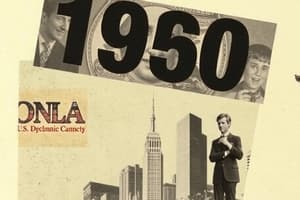Podcast
Questions and Answers
What was one of the main reasons a financial catastrophe did not occur during the 1979-80 crisis?
What was one of the main reasons a financial catastrophe did not occur during the 1979-80 crisis?
- Wealthy Arabs had liquid investments.
- The government intervened immediately.
- Wealthy Arabs held illiquid long-term investments. (correct)
- Stock markets recovered quickly.
According to the content, how did wealthy Arabs change their investment strategies after the 1980 crisis?
According to the content, how did wealthy Arabs change their investment strategies after the 1980 crisis?
- They invested more in real estate.
- They favored illiquid investments.
- They shifted from short-term to long-term investments.
- They began to prioritize liquidity. (correct)
What type of investments were wealthy Arabs primarily holding during the financial uncertainty?
What type of investments were wealthy Arabs primarily holding during the financial uncertainty?
- Liquid bank accounts.
- Illiquid long-term investments. (correct)
- Short-term bonds.
- High-risk stocks.
What was the effect of wealthy Arabs not being able to quickly liquidate their investments during the crisis?
What was the effect of wealthy Arabs not being able to quickly liquidate their investments during the crisis?
What lesson did wealthy Arabs learn from the panic of 1980?
What lesson did wealthy Arabs learn from the panic of 1980?
What was the general sentiment among wealthy foreign investors four years after the panic?
What was the general sentiment among wealthy foreign investors four years after the panic?
Which of the following best describes the economic environment in 1979-80?
Which of the following best describes the economic environment in 1979-80?
What type of investments did Michael Seist mention the Arabs were turning their focus towards in 1984?
What type of investments did Michael Seist mention the Arabs were turning their focus towards in 1984?
How did the lack of liquidity affect the response to the 1980 crisis?
How did the lack of liquidity affect the response to the 1980 crisis?
What was a characteristic of the investments held by wealthy Arabs during the period of financial uncertainty?
What was a characteristic of the investments held by wealthy Arabs during the period of financial uncertainty?
Flashcards are hidden until you start studying
Study Notes
The 1980 Financial Crisis
- In the late 1970s and early 1980s, the world faced a potential financial catastrophe more severe than any before.
- High inflation was prevalent globally with a worry that money would become worthless.
- The crisis did not materialize because of a fortunate situation involving wealthy Arab investors.
- These investors had invested significantly in the US in the form of long-term illiquid investments like real estate.
- This made it impossible for them to quickly withdraw their investments in case of a financial crisis.
- This prevented a major financial crisis from occurring because they were unable to sell off their assets quickly.
- This event allowed governments to control and manage the panic more effectively.
- The 1980 crisis taught these investors a valuable lesson.
- In 1984, a Wall Street Journal article reported that wealthy Arab investors had shifted their investment strategies to short-term investments like bank deposits.
- The shift was aimed at increasing liquidity and enabling faster withdrawals in case of future market volatility.
- This demonstrates that even after several years, foreign investors remained cautious and sensitive to potential financial instability.
Studying That Suits You
Use AI to generate personalized quizzes and flashcards to suit your learning preferences.





